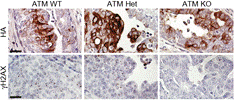Veterinary and Biomedical Sciences, Department of
Document Type
Article
Date of this Version
8-2015
Citation
Published in Journal of Immunological Methods 426 (2015), pp. 86–94; doi: 10.1016/j.jim.2015.08.007
Abstract
Antigen-specific, T cell hybridomas are useful to study the cellular, molecular and functional events, but their generation is a lengthy process. Thus, there is a need to develop robust methods to generate the hybridoma clones rapidly in a short period of time. To this end, we have demonstrated a novel approach using major histocompatibility complex (MHC) class II dextramers to generate T cell hybridomas for an autoantigen, proteolipid protein (PLP) 139–151. Using MHC class II dextramers assembled with PLP 139–151 as screening and sorting tools, we successfully obtained mono antigen-specific clones within seven to eight weeks. In conjunction with other T cell markers, dextramers permitted phenotypic characterization of hybridoma clones for their antigen specificity in a single step by flow cytometry. Importantly, we achieved successful fusions using dextramer+ cells sorted by flow cytometry as a starting population, resulting in direct identification of multiple antigen-specific clones. Characterization of selected clones led us to identify chemokine receptor, CCR4+ to be expressed consistently, but their cytokine-producing ability was variable. Our work provides a proof-of principle that the antigen-specific, CD4 T cell hybridoma clones can be generated directly using MHC class II dextramers. The availability of hybridoma clones that bind dextramers may serve as useful tools for various in vitro and in vivo applications.



Comments
Copyright © 2015 Elsevier B.V. Used by permission.